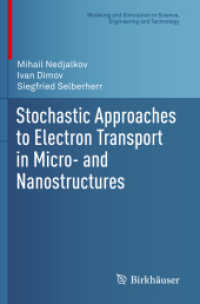- ホーム
- > 洋書
- > 英文書
- > Computer / General
基本説明
SL: Lecture Notes in Artificial Intelligence.
Full Description
This PROPOR Workshop follows previous workshops held in 1993 (Lisbon, Portugal), 1996 (Curitiba, Brazil), 1998 (Porto Alegre, Brazil), 1999 ' (Evora, Portugal), 2000 (Atibaia, Brazil) and 2003 (Faro, Portugal).








